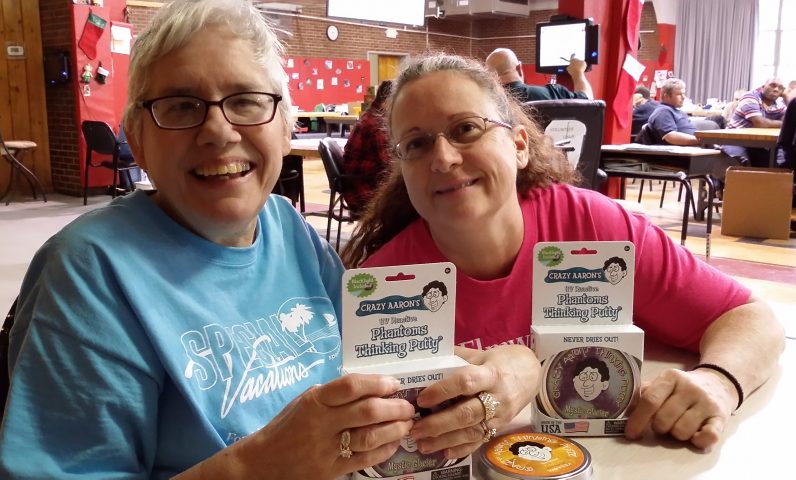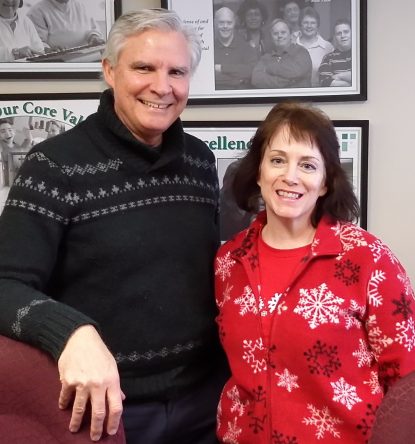
Cathy (left), a day program participant, and Helen Rizzuto, a floor supervisor, display finished orders for a local craft supplier that partners with the Communities of Don Guanella and Divine Providence’s work activity center in Secane in December 2017. (Gina Christian)
The Don Guanella and Divine Providence communities trace their origins in the Philadelphia area to St. Luigi Guanella (also known as “Don,” or “Father,” Guanella), a 19th-century Italian priest who ministered to children with physical and intellectual disabilities.
In the late 1940s and 1950s, the Archdiocese of Philadelphia invited Don Guanella’s religious orders — the sisters of the Daughters of St. Mary of Providence and the priests and brothers of the Servants of Charity — to establish facilities in the region.
[hotblock]
The expansion of the mission of care over the years, along with more recent state initiatives to downsize large institutional care settings, has shaped the current structure of the communities.

Mark Bradford (left), senior director of philanthropy, and Barbara Jenkins, director of admissions and communications, focus on both the spiritual and the strategic in the mission of the Don Guanella and Divine Providence Communities. (Gina Christian)
Don Guanella Village had maintained an institutional care facility in Springfield, Delaware County since 1960 before transitioning to the community-based group home model beginning in 2014 with cottages in Chester and Delaware counties. The Springfield property remains under agreement of sale.
Though deeply rooted in their patron saint’s spirituality, the Don Guanella and Divine Providence communities — which are licensed by Pennsylvania’s Department of Human Services as intermediate care facilities (ICFs) for individuals with intellectual disabilities — have also developed what Don Guanella’s development officer Mark Bradford calls “a very robust strategic planning process.”
That process includes the retention of a quality and risk management director, who has established strict protocols regarding security procedures, medication administration and incident reporting.
“I’ve never thought to worry about my sister being there,” said Cathleen Reis, sister of Noreen, a resident of the communities. “The documentation, the communication through emails and phone calls, is bar none.”
A self-described “gym rat” who walks several miles each day, Reis works closely with the staff to ensure her sister maintains a healthy weight.
“They never make me feel like I’m being intrusive in following up about Noreen,” she said. “They keep her active and walking, and follow my requests with open arms.”
Transparency and family involvement are among Don Guanella and Divine Providence’s “best practices,” according to spokesperson Barbara Jenkins.
“We have great relationships with other providers, and we’re in lots of groups where we all meet to find shared solutions to problems,” she said. “We aren’t in a vacuum.”
Bradford notes that part of finding such shared solutions lies in “building a culture of philanthropy” to offset cuts in federal support.
“There isn’t anyone that I know of who thinks that Medicare and Medicaid are going to continue at the same level they have in the past,” he said. “Thanks to generous donors over the years, we’re able to expand and contract with the need. Some smaller organizations don’t have that luxury, and they’re going out on a line of credit to try to make their payroll.”
PREVIOUS: Smiles you can’t fake: Joy of work, life and love for our most vulnerable
NEXT: Firm will plan sale, development of St. Katharine Drexel property



Thank you for all that you do. I invite you and all of those at Don Guanella and Divine Providence to attend Our Community Cup Coffeehouse http://ourcommunitycup.com in Springfield. It was started by New Avenue Foundation http://newfdn.org several years ago. It is a place for families and caregivers to attend with their family members to enjoy an evening out. Dinner and dessert are provided as well as live music every Friday. We only ask a donation to attend. We are celebrating our 3rd anniversary on February 17 with an all-day music festival. Hope to see you at our events.
Thank you St Don Guanella – your love – concern & care for Our Lords special children – continues today within the walls of DPVilages & DGVillages – as the great Kevin Barr said, ” We’re family ” – parents – entire staff – special men & ladies & our generous donors – (who are like our big brothers & sisters ) all giving our time – talents – love – to help our children reach their God willing potential – thank you St Don for such blessings bestow upon all of us working together with the love of Christ.
My daughter – Katie the Katie – has been living at DPV since 1984 – she has grown into a loving caring young adult – full of life – always learning something new – & sharing her big beautiful smile with all her family at DPV & DGV. Thanks to ” We’re family” she has achieve so much & is truly an unique – happy -full of love young lady.
Every time I leave her at the village- after a weekend home – the tears start to fall – yet – I know she is in good hands at home away from home .
Thank you all members of our beautiful family – for all you do in your own way – for Katie & our special men & ladies.
As the Great Mark would say-
” God Bless ”
Your ” Young” Friend ,
Guyball
Katie’s Dad
These were very inspiring and informative articles,